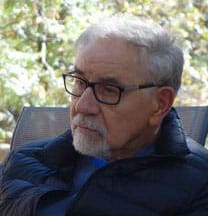 Cantors performing at Shomrei Torah Synagogue’s “Songstruck.” From left: Stephanie Kupfer, Daniel Friedman, Jackie Rafii, Marcus Feldman and Lisa Peicott.
Cantors performing at Shomrei Torah Synagogue’s “Songstruck.” From left: Stephanie Kupfer, Daniel Friedman, Jackie Rafii, Marcus Feldman and Lisa Peicott. On a recent rainy Saturday night, facing a full house in the roomy sanctuary at West Hills Shomrei Torah Synagogue, Jackie Rafii, the shul’s cantorial soloist, stood center stage. She was there to introduce “Songstruck,” an evening of cantors performing songs and melodies of their own choosing.
As the concert was about to start, Rafii appeared shaken. Speaking into a microphone she stammered, “We have a little technical problem. Nothing really, just a little thing. You know it’s raining outside, right? And there’s a lot of traffic. After all, this is L.A. La La Land? What I’m trying to say is none of the other cantors are here yet.”
There were murmurs and gasps from the more than 400 people who had packed the sanctuary. “But that’s OK,” Rafii said. “You know, the show must go on. So, I’m going to wing it till they get here. You’re OK with that, right?” The audience applauded guardedly.
Rafii took a deep breath, nodded to the musicians behind her, and the band started to play “Another Day of Sun,” the opening number from the movie “La La Land.” In a supple, melodic vocal instrument that can handle pop music as deftly as liturgical melodies, Rafii sang the opening verse.
In the brief pause after the end of that verse, someone in the audience suddenly stood up, and in a voice worthy of a Broadway show, belted out the next verse. The crowd craned to see the singer: a woman in an elegant, red evening gown. Then, in a different part of the audience, a man with a kippah, wearing suit and tie, took on the next verse.
This was followed by another elegantly dressed audience member. Her powerful soprano voice took on the next verse as seamlessly as a runner taking the baton in a relay race. Finally, another male singer, also in a suit and kippah, joined in from another part of the audience. It dawned on the crowd that these were indeed the cantors slated to perform and that Rafii’s nervousness had been an act. The audience laughed and cheered.
The four cantors planted in the audience were Lisa Peicott from Wilshire Boulevard Temple; Daniel Friedman, senior cantor at Temple Ramat Zion; and Cantor Stephanie Kupfer and Senior Cantor Marcus Feldman from Sinai Temple. They moved to the stage and joined Rafii for the song’s final refrain.
“In shul, we sing liturgical music but we became cantors because we love music, so a night of nonreligious music gives us a chance to express our love for all music.” — Lisa Piecott
That opening gimmick allowed attendees to see these cantors in a more human and familiar light.
Peicott, who sang the aria “Quando M’en Vo” from Puccini’s “La Boheme,” told the Journal that “in shul, we sing liturgical music but we became cantors because we love music, so a night of nonreligious music gives us a chance to express our love for all music.”
During the evening’s two-hour show, the five cantors plus Rabbi Erez Sherman and Cantor Ron Snow, displayed their musical chops in offerings that ranged from a 1950s top-of-the-charts ballad and jazzy standards to multi-layered dramatic songs from Broadway hits.
The program also included some liturgical songs. Feldman sang two Hebrew prayers set to music in the 20th century, one by former Sinai Temple Cantor Meir Finkelstein.
Daniel Raijman, guitarist and composer for film and TV who arranged the music and conducted the band for the evening, said that the show’s variety was one of its most challenging aspects. “Each cantor chose his or her own songs but once they did that, we had to figure out how to organize it and pace it,” he said. “In certain pieces, we had to use what we had — guitar, keyboards, violin, drums, electric bass and double bass — in place of horns or string section.”
Rafii said she was struck by the variety of music the cantors brought to the project. “I knew our guest cantors were incredibly talented and trained in various musical backgrounds,” she said. “But I was blown away by the level of versatility and skill when I asked them to share some of their favorite songs. As we brainstormed and rehearsed, I saw that these musical backgrounds were a core part of each of us, informing our musical passions, sensibilities and personalities.”
Rafii also brought her own varied background to “Songstruck.” While in law school, she took classes at a cantorial program and continued to do so while practicing as an attorney at an entertainment law firm. “I was feeling more and more pulled to the calling of the cantorate,” she said, “and nurturing that passion.” In 2017, she began working at Shomrei Torah as cantorial soloist and expects to become an ordained cantor “within the next few years.”
“Songstruck’s” showstopper came toward the end of the evening when Rafii, at the piano, sang her own composition, “One Thing.” The refrain was “You are the one thing that makes me feel whole.” Whether the “one thing” referred to Rafii’s fiancé, God, music or to all of them, it was touching and beautiful.
“Songstruck” ended with all the cantors on stage singing “This Little Light of Mine.” At the start of the event, Rafii told the audience, “May your souls be moved,” and from the enthusiastic response — standing ovations and bouquets for the singers — that was clearly the case. n





















 More news and opinions than at a Shabbat dinner, right in your inbox.
More news and opinions than at a Shabbat dinner, right in your inbox.